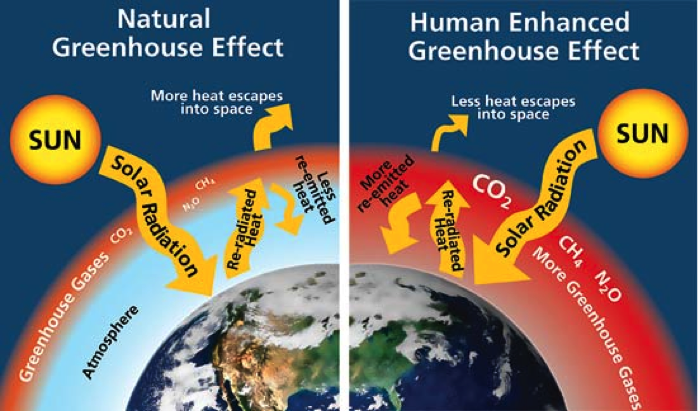Q1. Understanding Earth’s energy balance is essential to understanding the issue of global warming. For example, the solar energy striking Earth’s surface averages 168 watts per square meter (W/m²), but the energy leaving Earth’s surface averages 390 W/m². Why isn’t Earth cooling rapidly?
Answer: The Earth isn’t cooling rapidly even though the amount of energy leaving the Earth’s surface is twice the amount of energy striking the Earth’s surface because of the greenhouses gases in the atmosphere trapping the heat. The reason for the huge difference is also due to anthropogenic sources of carbon emission such as fossil fuel usage/slash & burn and industrial processes, therefore, adding to the increase of energy leaving the Earth’s surface.
Q2. Decide and explain where the statement is correct or incorrect. Explain.
Answer: The statement is incorrect. If there are extreme weather conditions, it means that global warming has worsened. Winter in certain parts of the globe doesn’t indicate that global warming is not detrimental to Earth and that other parts of the globe is not affected by global warming.
Q3. One of the first radar devices developed during World War II used microwave radiation of a specific cell age range that triggers the rotation of water molecules. Why was the design not successful?
Answer: The design was not successful because of the wrong use of radiation. The frequency of microwave is too low and hence, is not high enough to penetrate to the chemical bonds to trigger the rotation of water molecules.
Q4. Now that you have studied air quality (unit 1), stratospheric ozone depletion (unit 2), and global warming (unit 3), which do you believe poses the most serious problem for you in the short run (pick one and explain)? In the long run, (pick one and explain why)?
Answer: In the short run, global warming poses the most serious problem because of the emission of greenhouse gases and extreme temperature. This directly causes factors (e.g increase of sea level, temperature of Earth) that poses as more imminent danger to living things such as health issues or environmental problems. In the long run, ozone depletion causes the most serious problem. This is because of the hole created in the ozone layer that protects us from the ultraviolet rays of the sun and the other dangers (e.g injury to marine organisms and plants) that arises from the sun’s ultraviolet onto the Earth.

